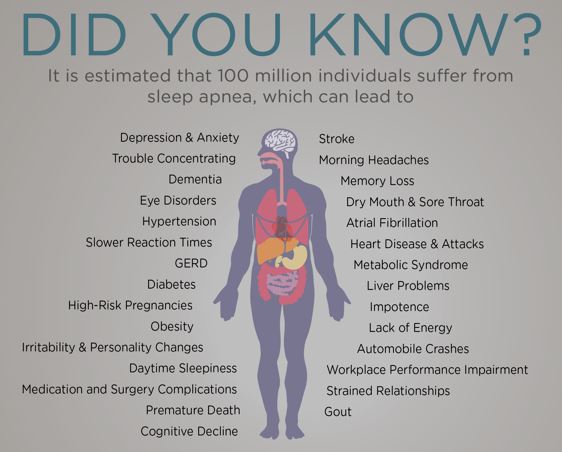10 Serious Health Risks of Untreated Obstructive Sleep Apnea
10 Serious Health Risks of Untreated Obstructive Sleep Apnea
Obstructive Sleep Apnea (OSA) is more than just loud snoring—it’s a serious medical condition that affects millions of people. If left untreated, OSA can lead to life-threatening health problems. At Comprehensive Sleep Care Center, we specialize in diagnosing and treating sleep apnea to help you achieve better sleep and overall health. Here are the top 10 dangers of untreated obstructive sleep apnea:
- High Blood Pressure (Hypertension)
The repeated drops in oxygen levels during sleep force your heart to work harder, increasing your risk of high blood pressure. If you already have hypertension, sleep apnea can make it worse and harder to control.
- Heart Disease
OSA strains the cardiovascular system, leading to a higher risk of heart attacks, irregular heartbeats (arrhythmias), and even heart failure. Proper treatment can significantly reduce this risk.
- Stroke
People with untreated sleep apnea are at a much higher risk of suffering a stroke due to poor oxygen circulation and increased blood pressure.
- Type 2 Diabetes
Sleep apnea disrupts your body’s ability to regulate blood sugar, increasing the likelihood of insulin resistance and diabetes.
- Daytime Fatigue and Sleepiness
Frequent awakenings throughout the night lead to excessive daytime drowsiness, affecting your ability to concentrate, work efficiently, and stay alert while driving.
- Increased Risk of Car Accidents
Due to impaired cognitive function and drowsiness, individuals with untreated sleep apnea are more likely to be involved in motor vehicle accidents.
- Weakened Immune System
Poor sleep quality weakens the immune system, making you more susceptible to illnesses and infections.
- Depression and Anxiety
Sleep deprivation caused by OSA is linked to mood disorders such as depression and anxiety, impacting mental health and emotional well-being.
- Memory and Cognitive Decline
Chronic oxygen deprivation and disrupted sleep cycles can lead to problems with memory, concentration, and even an increased risk of developing dementia.
- Shortened Lifespan
Untreated OSA significantly increases the risk of life-threatening conditions, ultimately leading to a reduced life expectancy.

Take Control of Your Sleep Health
The good news? Obstructive sleep apnea is treatable! At Comprehensive Sleep Care Center, our expert team offers customized treatment options, including CPAP therapy, Oral Appliance Therapy, and lifestyle recommendations to improve your sleep and overall health.
💙 Don’t ignore the risks—take action today! Schedule a consultation with our sleep specialists and start your journey to better health.
📞 Call us or visit www.comprehensivesleepcare.com to book your appointment today!
#SleepApnea #SleepHealth #StopTheSnore #HeartHealth #DiabetesPrevention #ComprehensiveSleepCare #MilitaryLife #BetterSleepBetterHealth
